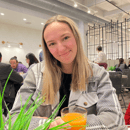Disordered eating has become increasingly common, and the normalization of it within our society is deeply problematic. Whether it be labeling foods as “good” or “bad,” shaming yourself or others for eating certain foods or beating yourself up after missing a workout, disordered ideas around food and exercise can take many forms. Hopefully with a better understanding of what these habits look like, we can better educate ourselves and others about what a healthy relationship with food and exercise truly is.
Eating disorders have become, unfortunately, commonplace within our society. According to ANAD, or National Association of Anorexia Nervosa and Associated Disorders, 9% of the U.S. population, or 28.8 million Americans, will have an eating disorder in their lifetime. Further, there are many cases of eating disorders that aren’t diagnosed; there are also many more people who suffer from disordered eating without it being a full eating disorder. Disordered eating is defined as many, but not all, patterns or behaviors of an eating disorder. Oftentimes disordered eating can become eating disorders, but not always. With that being said, disordered eating has become incredibly normalized, specifically in the ways that we talk about food and exercise. The habits and patterns that we have developed are problematic and the worst part is that we accept them as normal – without challenging them.


Disordered eating can also be incredibly prominent in spaces like college campuses. Such examples on college campuses include not eating before going out to have “more fun,” not eating to “cancel out” what you have eaten or drank before or commenting on other people’s food choices. It’s important to acknowledge that these behaviors are not normal, and yet, because they become such a part of our rhetoric, we accept them as such. Additionally, talking about these concepts as “normal,” or using them in casual conversation, can also be incredibly harmful to folks struggling with eating disorders.

So, what can we do about this? First, it’s so important to have grace with ourselves. We’ve been taught – whether it be from family members, social media or any other place we get information – that these behaviors are normal or acceptable. Because of that, we shouldn’t feel shame for internalizing these behaviors, because of the fact that they are so commonplace in our culture. With that being said, if anything mentioned above resonates with you, it is entirely possible to develop a healthy relationship with food and exercise. If we can learn these behaviors, we can also unlearn them. One of the most helpful things that we can do is to challenge our thoughts. For instance, if you feel guilty after eating dessert, try to dig deeper. Ask yourself, “Why do I feel guilty after I eat a dessert? Where does that guilt come from?” It can even be helpful to acknowledge that you have these thoughts, and simply notice them as they arise.
Being as disordered eating behaviors have become so normalized, it may be challenging to acknowledge these patterns within ourselves. But, we can try to work to unlearn the behaviors that we’ve been conditioned to learn, and hopefully educate ourselves and others.




